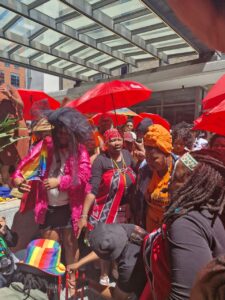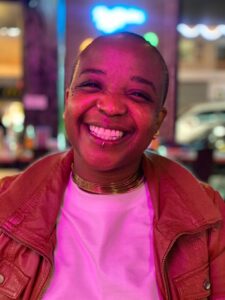Convenings and forums are always layered with complexities, even when they are necessary and life-giving to queer people. On the one hand, they present an abundance of opportunities to network, forge partnerships, bonds and community; connect with old friends and make new ones; commune; lean into a queer space; share strategies, information, our work and share the realities of our communities; and, to come together to put plans together to give life to a world that affirms and appreciates us as queer people.
On the other hand, if you look below the surface of this vision lies a facility and jarring reality: these spaces are fuelled with problematic dynamics, elitism and exclusion – a quiet violence that reflects the same violence we say we’re committed to ending. They tend to duplicate the very power structures they seek to dismantle, marginalising the voices of those they claim to represent and recreating hierarchies of privilege within the global LGBTIQ+ movement. A contradiction at its best which we seldom interrogate, resist, and, in so doing, co-opt into. Likewise, we cannot overlook the ways in which we conference.
In response to the inaccessibility, elitism and exclusion of the ILGA World Conference held in Cape Town in November 2024, a collective of local South African LGBTQI+ organisations unified on the sidelines of the conference to give life to Pavement Special. The Pavement Special Collective consists of Triangle Project, JASS Southern Africa, SWEAT, Asijiki Coalition, Queer Feminist Film Festival, Free Gender, Queer Food Growing Collective, Imbawula Queer Podcast, Rainbow Archive Narratives Project and Gender Equity Unit (University of the Western Cape).
The collective settled on the term “Pavement Special” which acknowledges queer people who have been dispossessed, historically excluded from dominant narratives, especially within spaces that claim to be inclusive but often reflect privilege. They recognise that naming is not a neutral act; it is political. It’s a reclamation of identity and space; an assertion of agency, which reflects their refusal to be confined by institutional boundaries or defined by external power structures. The Pavement Special was a protest as much as it was a collective force of resistance against neo-capitalism and the fallacy of solidarity rooted in inaccessible conference culture.
They shun a light on several issues.
Accessibility and Financial Barriers
One of the most glaring issues with global conferences like ILGA World is the weighty financial barrier to participation – the discounted price for locals was $400. Conferences are mostly held in expensive cities, expensive venues, and require significant financial resources for registration fees, travel, and accommodation. For activists from the Global South, particularly those from marginalised and under-resourced communities, attending such conferences is often financially unfeasible. The very people and communities they claim to prioritize are barred from entering the front door, sharing their experiences and occupying spaces they have every right to be in.
Lots of grassroots organisations and activists working on the frontlines, often risking their safety advocating LGBTIQ+ rights, particularly in Africa, Asia, and Latin America, operate on minimal budgets. Their work is often reliant on sporadic donor support, if not funding their own work. The cost of attending a global conference can easily equate to months or even a year’s worth of operational costs. Although sometimes scholarships and travel grants are made available, they are competitive, limited and often fail to prioritise the most marginalized people, such as trans, non-binary, intersex and those classified as non-white activists or those working on issues like sex work decriminalization, HIV prevention, abortion and in other contexts LGBTQI+ rights.

Elitism and Hierarchical Activism
Global conferences like ILGA World also reproduce elitism within the LGBTIQ+ movement. The very nature of these events: formal, academic, and often dominated by policy or inaccessible language, creating hierarchies of activism that privilege certain types of knowledge production, regeneration, reproduction and advocacy over others, fuelling the cycle of neo-capitalist approaches to social justice.
Academics, legal and policy experts, and delegates from well-funded international NGOs are often given the most visibility and platform at these conferences. Their glossy presentations and technical expertise are valued over the lived experiences, which aren’t deemed expert knowledge from grassroots activists working directly in and with marginalised communities. This perpetuates a dynamic where those who can “speak the language” of policy and academia are seen as more credible or legitimate than those whose work is grounded in lived experiences and community-based activism.
Tokenization and Erosion of Local Contexts
Global conferences like ILGA World often tokenize marginalized voices for optics. While they may strive for diversity in speaker line-ups and panel discussions, this diversity is often surface-level. Activists from the Global South, particularly Indigenous and Black activists, are often invited to share their experiences and rarely meaningfully engaged or given positions of influential power within the conference structure.
These activists are made spectacles of and asked to share personal stories of struggle and resilience, which are then used to represent the global nature of LGBTIQ+ oppression without a nuanced and intersectional acknowledgement or reflection. Their insights into decolonisation, systemic inequalities and violence, and systemic change are often undermined or set aside. This tokenization prunes their participation to a symbolic token of action instead of a genuine effort to centre their expertise and leadership.
Reproducing Power Dynamics within the LGBTIQ+ Movement
The structural issues within global conferences like ILGA World mirror rife power dynamics within the global LGBTIQ+ movement. These spaces often reflect colonial and neo-colonial dynamics, where organisations and activists from the Global North hold disproportionate funding, power, and influence over the movement’s direction.
These dynamics are particularly evident in how funding is distributed within the movement. Donor priorities, primarily influenced by organisations in the Global North, determine which issues are deemed important and which are shelved. Activists from the Global South are repeatedly pressed to align their work with these donor priorities to secure funding, even when these priorities do not support or speak to the needs and realities of their communities.
Towards More Inclusive and Equitable Global Spaces
To address the problematicness, elitism, and exclusion of global conferences like ILGA World, it is essential that we reimagine these spaces as truly inclusive, equitable, and community-centred. We must think through and acknowledge how we get co-opted into reproducing the problems when we don’t push back, voice these issues and/or even potentially boycott spaces. This requires a fundamental shift in how these conferences are organized and who holds power within them.
We need to stand by our commitment to advocating for and ensuring financial accessibility, with significantly raised funding for scholarships and travel grants for activists from marginalised communities.
Organisers must prioritise grassroots activists, particularly those from the Global South, by ensuring that they can access these elitist and exclusionary spaces and occupy meaningful leadership roles.
There has to be a shift in power dynamics within the global LGBTIQ+ movement, which requires collective work and increased investment in and leadership from organisations and activists in the Global South. It is only by centring the voices of those most affected and who have been pushed into the margins by multiple inequalities and systems of oppression that can we co-create a genuinely inclusive and transformative global movement for LGBTIQ+ rights.
 Mamello Sejake is a wildflower, a Black queer decolonial feminist writer, researcher, activist and an Afro fairy. Their research interests and writing are dedicated to queer storytelling; exploring the politics of sexualities; identity politics; gendered dynamics; and, the complexities, contradictions and politics of kink.
Mamello Sejake is a wildflower, a Black queer decolonial feminist writer, researcher, activist and an Afro fairy. Their research interests and writing are dedicated to queer storytelling; exploring the politics of sexualities; identity politics; gendered dynamics; and, the complexities, contradictions and politics of kink.
This piece is the first in our African Feminist Takes from the 31st ILGA World Conference. Between 11 to 15 November 2024, the ILGA World Conference was hosted in Africa for the first time in 25 years in Cape Town, South Africa. The ILGA World Conference is the largest global gathering of LGBTIQA+ changemakers bringing together LGBTQIA+ human rights defenders and development experts, policy makers, international human rights mechanisms experts, researchers, journalists, funders, and allies worldwide.
The conference convened under the theme Kwa umoja we rise!, a mix of Swahili and English – “Kwa umoja” meaning “Together” or “In unity’’, came at a time when many African feminist and queer movements are dealing with ongoing anti-rights pushback. African LGBTQIA+ movements are actively advocating for social justice alongside other groups, yet they face specific, ongoing violence and discrimination, and they risk losing hard-won rights. More than most, they face an environment of scapegoating, making human rights efforts increasingly challenging. Despite these setbacks, there’s been some progress in some countries in recent years, underscoring the critical need for solidarity and collaboration across movements. In the face of violent opposition, building bridges and inclusive movements in the pursuit of justice and a better future for all is essential.
African Feminism – AF, with the support of the African Women’s Development Fund (AWDF), collaborated with African feminists to share their perspectives from the conference, stand in solidarity with and support queer liberation movements on the African continent. This collaboration is centered on amplifying voices and narratives through an intersectional lens, highlighting emerging issues and lived experiences, while enhancing resistance and feminist consciousness.
The African Women’s Development Fund (AWDF) stands at the heart of Africa’s feminist movement as a transformative feminist fund dedicated to resourcing, nurturing, and strengthening women’s rights initiatives and feminist movements across the continent. As an active partner and fierce champion for gender justice, AWDF supports organisations to build sustainable foundations while creating lasting, systemic change across Africa.

A beautiful piece of work.